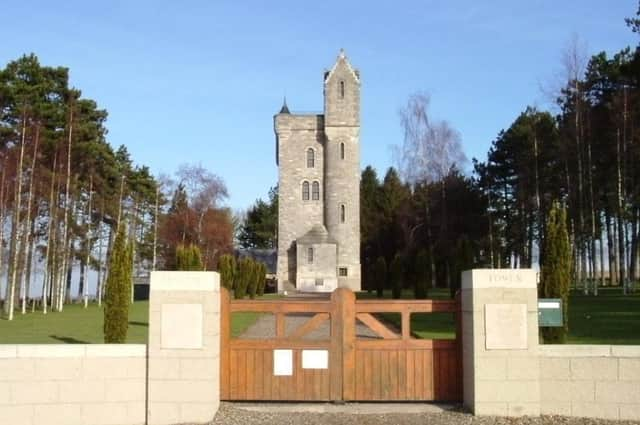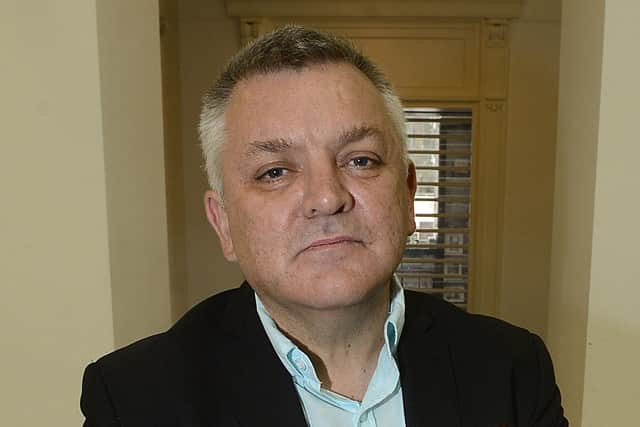Henry McDonald: My family’s roots that bind us to Ypres and the Somme


In relation to the war dead especially those who perished in the terrible global conflicts of the 20th century those roots interconnect deeply under the great schism of Orange and Green that divides this society.
Researching and then writing a new novel based in large part one of my ancestors who fought on the Somme and later at Ypres those shared roots have become more apparent than ever.
Advertisement
Hide AdAdvertisement
Hide AdThe book shuttles back and forward from the Western Front battlefields in 1916 to a haunted London Underground station in the 21st century. Its two main principal characters are fictional versions of my great grandfather Samuel Stewart and one of his great grandsons who like the old veteran had also served in the British Army.


Although Samuel becomes Elijah in the narrative (the use of Old Testament imagery is prevalent throughout the World War One chapters) this man’s home was the same one as my great grandfather’s – in Lower Urney Street off Belfast’s Shankill Road.
In one scene I imagined Samuel/Elijah returning on home leave to visit his wife, a reunion that doesn’t go to plan for him.
As he departs from the house and makes his way towards the Shankill Road to catch a tram that will deliver him near Belfast docks Samuel/Elijah spots a little girl hiding in the shadows.
Advertisement
Hide AdAdvertisement
Hide AdBarefoot she scurries across the gas lit street and hammers on the door of a house. As the child frantically wraps on the knocker Samuel/Elijah notices that the front window has been smashed and replaced with thin cardboard. Beneath this act of vandalism someone has scrawled in chalk: “Rebels Out”. When the girl finally goes inside my main character observes a little trail of blood in parallel with fragments of broken glass leading to the door.
It is only a few months after the Easter Rising in Dublin and Samuel/Elijah remembers that a Catholic soldier lived with his family also in Lower Urney street and that this brave man was serving over in France with the Connaught Rangers. Samuel/Elijah leaves the Shankill even more depressed now than when he left his home a few minutes earlier. The Connaught Rangers’ family were targeted for something that happened 100 miles south, for something they had nothing to do with and knew little about.
This particular scene was in my head long before I picked up and read another far too neglected book about the Irish experience of the Great War.
Richard S.Grayson’s ‘Belfast Boys: How Unionists and Nationalists fought and died together in the First World War’ was first published in 2009 and deserves to be deemed a classic in the city’s Great War history. It charts the fate of men from either side of West Belfast’s sectarian divide including the untold stories of Catholic soldiers who fought on the Somme and other battlefields in the 16th Irish Division.
Advertisement
Hide AdAdvertisement
Hide AdAmong Grayson’s superbly researched accounts of Catholic veterans was Connaught Ranger Patrick O’Hare who served a total of 13 years in the regiment. His service however did not spare him and his family from armed sectarian attackers who trashed their house in Urney Street and drove the O’Hares out of the area they had lived in.
This attack occurred on 21 June 1921 rather than the fictional assault on the family home five years earlier. The context were the sectarian pogroms against northern Catholics as partition became a reality and the state of Northern Ireland was born.
Patrick O’Hare survived being told by the ransacking gang that they were going to shoot the ex-British soldier. His grandson Sean explained to Grayson that Patrick was saved by regular British troops manning a peace line between the Shankill and the Falls. The troops acted after one of Patrick’s daughters showed them her father’s military paybook and they intervened to exfiltrate him and his family out of Urney Street.
Patrick’s grandson Sean is my uncle having married the sister of my mother in the 1960s. The startling coincidence between the shameful real life targeting of a Great War veteran in 1921 and the attack on the home of the fictional family in the same street following the Easter Rising is uncanny.
Advertisement
Hide AdAdvertisement
Hide AdMoreover, the real ‘Elijah’ lived in the very same street as the Catholic man whose grandson would later marry one of Samuel Stewart’s granddaughters. Who was it who said there are no coincidences!
Among other books I devoured while researching the novel was ‘Journey of Remembering’ which lists in alphabetical order the Great War dead of Belfast. It includes Samuel Stewart and also Private Andrew McDonald, a Catholic great uncle on my father’s side of the family.
Andrew’s story is particularly poignant as we approach this week’s Armistice Day.
He was born in Scotland but grew up in Saul Street in the Short Strand/Ballymacarrett district of East Belfast. He served in the Highland Light Infantry and was killed on 8 October 1918, just almost exactly before the guns fell silent and the slaughter was over.
Advertisement
Hide AdAdvertisement
Hide Ad• Other comment pieces below, and beneath that information on how to subscribe to the News Letter
• Ben Lowry: A poll that finds support for UK, DUP and ending protocol checks – not something you hear often
• Ruth Dudley Edwards Nov 2: Stephen Nolan seen as a hero in GB for his reports into Stonewall
• Henry McDonald Nov 1: Touching novel raises the plight of Irish world war veterans
Advertisement
Hide AdAdvertisement
Hide Ad• Owen Polley Oct 30: Unconvincing poll was twisted by pundits to support the NI Protocol
• Writers Oct 30: We probe Irish nationalist myths in our new book which defends the Union
• Ben Lowry Oct 30: The return of inflation will suit debtors and punish savers
• David Montgomery Oct 28: Put NI politicians at heart of the talks to resolve the dispute over the protocol
Advertisement
Hide AdAdvertisement
Hide Ad• Baroness Hoey Nov 1: Montgomery article fails to recognise that SF won’t work for the interest of NI
• Peter Robinson Oct 29: SF finance minister’s fiscal policy is to hold out his hand for more UK cash
• Henry Patterson Oct 27: Terror is being legitimised in Basque Country as it is in NI
——— ———
A message from the Editor:
Thank you for reading this story on our website. While I have your attention, I also have an important request to make of you.
Advertisement
Hide AdAdvertisement
Hide AdWith the coronavirus lockdowns having had a major impact on many of our advertisers — and consequently the revenue we receive — we are more reliant than ever on you taking out a digital subscription.
Subscribe to newsletter.co.ukand enjoy unlimited access to the best Northern Ireland and UK news and information online and on our app. With a digital subscription, you can read more than 5 articles, see fewer ads, enjoy faster load times, and get access to exclusive newsletters and content.
Visit
to sign up
Our journalism costs money and we rely on advertising, print and digital revenues to help to support them. By supporting us, we are able to support you in providing trusted, fact-checked content for this website.
Ben Lowry, Editor